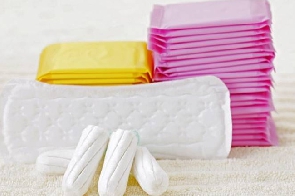De economy of Ghana dey go through massive challenges, de growing rate of inflation since January increase cost of living in de country. According to Ghana Statistical Service, inflation hit 37.2% for de month of September, dis be de highest in over 20 years. Away from de statistics den economic figures, some people dey experience de harrowing effects of inflation in dia personal lives, most of whom no fit afford some basic essentials. 21 year old salesgirl for Accra, Anita say she no dey fit buy sanitary pads for her monthly period sake of de high prices. According to Anita, sometimes she no dey eat just so say she go fit save some money to buy sanitary pads which now dey cost Ghc15 for one pack. “Early dis year I buy pad Ghc7, then e go Ghc8, now pad be Ghc14 some dey sell am Ghc15 cedis. Sake of dis I no fit use pad three times a day, I for use am just twice den save de remaining for de following month” she talk BBC Pidgin. She explain based on her salary and rate at which cost of pads go high, sometimes she for borrow to buy sanitary pads. “Sometimes I for borrow and pay later, other times I no go eat, instead I go save de money take buy sanitary pads” Anita talk. “Because I no fit buy pad for Ghc30 monthly, where I dey get that main money from sef?”
My husband @kwamecrentsil had gone to a shop around house. A young girl was leaving the shop after he heard her say, 'is that the new price'? She was already gone before he could help her. Guess what she wanted to buy but couldn't. SANITARY PAD! 20% tax on sanitary pads. Why? — tamakloeaseye (@tamakloeaseye) May 31, 2022 ‘I dey switch from pad to menstrual cap’ Amidst de high price of sanitary pads, some women for Ghanaians dey switch to other products so say dem go fit reduce cost. Another woman, Williams who dey work for renowned bank in de country say she switch to menstrual cup so say she go shun dey buy pads monthly. “As de year dey start, I buy pads for as low as Ghc5, now pads dey cost Ghc12 dey go. We no fit run away from using it as women, but how say I go spend dis much on just pads” she talk. “For working woman, e be quite okay but me sef I switch go menstrual caps, so I no fit imagine de unemployed, those in de villages, teenagers den stuff, how dem go cope with de prices” she add. Through reading, Williams say she chance on menstrual cap which she go fit reuse every month, all she for do be wash am well. She dey believe say dis go help am save some money compared to de situation where she for buy pad monthly while de prices continue dey increase. How 20% import duty tax and 12.5% VAT on sanitary pads dey increase prices One of de things which dey make pads more expensive for Ghanaians be sake of tax wey govment place on am. Ghana classify menstrual hygiene products as luxury products, as a result de taxes be heavy on pads. De implications be say as inflation dey raise price of goods for Ghana, pads dey cost higher sake of de 20% import duty which dey on am. Activists for Ghana call on various govmemts to remove de 20% import duty tax dem place on sanitary pads but govments no remove am. In addition to de import duty tax, another 12.5 per cent Value Added Tax (VAT) govment place on sanitary products to which dey make am even more expensive. Till date, govment no remove such taxes, making pads expensive for women and girls across de country. Meanwhile, other African countries like Kenya and South Africa have review taxes on sanitary products, like Nigeria who remove VAT on locally manufactured sanitary products.
BBC Pidgin of Friday, 14 October 2022
Source: BBC
















